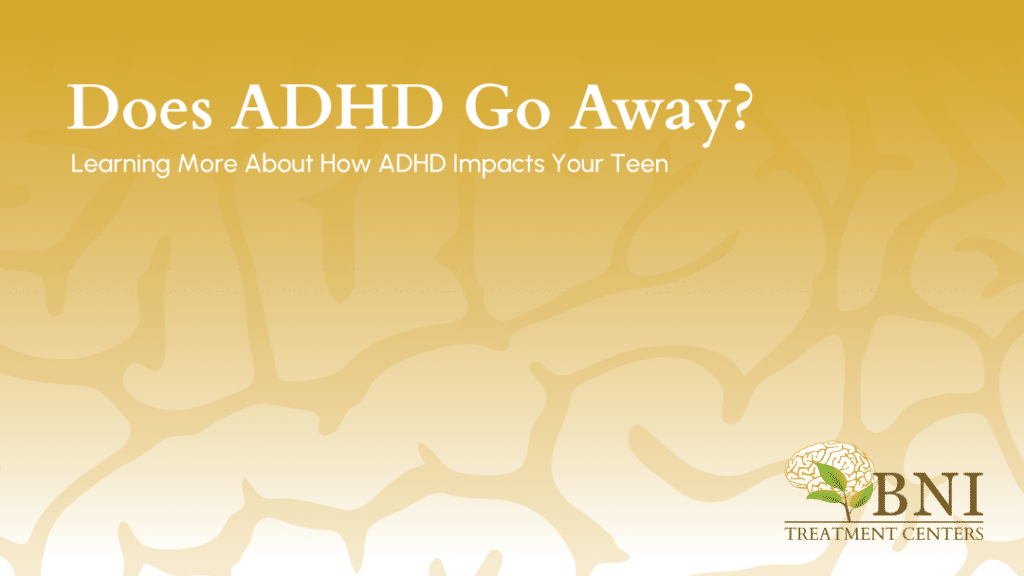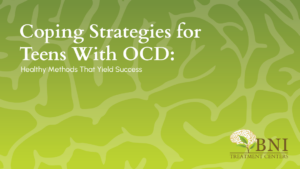
ADHD can greatly interfere with someone’s life. Whether it’s at school and work, or in their friendships and dating life, individuals with ADHD face challenges every single day. Research suggests that teenage boys with ADHD have lower GPAs, and are eight times more likely to drop out than their counterparts.
No parent wants their teen to live with these disadvantages, and many wish their children could leave these challenges behind as they transition into adulthood. At BNI Treatment Centers, we focus on not only treating your teen’s ADHD, but in helping them achieve the future they deserve. Our dedicated team of psychiatrists diagnose and treat ADHD effectively, teaching the skills and coping mechanisms your teen needs to thrive, academically and beyond.
But is it possible to simply outgrow ADHD? Some say ADHD is a lifelong condition, and there’s only so much that can be done. What’s the truth? Does ADHD go away? Today, this article aims to answer these questions.
Can You Outgrow ADHD?
ADHD doesn’t just go away for most people.
While findings on how often ADHD persists into adulthood are mixed, recent research agrees that most children with ADHD have symptoms as adults.
One longitudinal study determined that 60% of children with ADHD continued to have symptoms as they aged, with 41% experiencing some level of impairment.
Another study tracking participants from childhood to adulthood determined that only 10% of cases entered complete remission for ADHD. 60% lost full diagnostic criteria, meaning their symptoms lessened, but didn’t go away altogether.
Researchers in Finland found that even with apparent recovery from ADHD symptoms, the changes in the brain associated with ADHD were still present in young adulthood. These changes include less gray matter and a smaller brain size than those in the study without ADHD. The same study determined that adults who had ADHD in childhood and did not meet diagnostic criteria in adulthood still experienced working memory impairments.
This underscores the importance of effective treatment by trained professionals. Many aspects of ADHD can remain a lifelong condition, and it’s critical that teens are given the tools they need to succeed. While medication can be necessary, developing effective coping mechanisms and skills remains key to success.

How Does ADHD Change With Age?
However, not all symptoms of ADHD are equally persistent. Often, teens outgrow the hyperactive symptoms of ADHD – or at least don’t display them the same way they did as children.
Symptoms can often lessen in adulthood. This may be due to adults having more freedom to choose jobs that suit their needs better, or due to developing helpful habits they didn’t have as children. Adults often learn better coping mechanisms than teens as well, though this can be a painful or difficult process if left unguided.
When Are ADHD Symptoms Most Severe, and What Are They?
Symptoms of ADHD are at their worst during childhood. Severe ADHD can be diagnosed when a child is as early as four years old. General symptoms of ADHD often emerge between the ages of three and six. As individuals age, their symptoms – especially hyperactive symptoms – often lessen in severity, even if they don’t entirely go away.
Broadly speaking, there are three categories of ADHD symptoms: hyperactive, inattentive, and a mixture of the two.
Inattentive symptoms generally have to do with the cognitive side of ADHD, and include:
- Failing to notice small details
- Having trouble holding attention during tasks or play
- Not listening when spoken to
- Trouble following directions and finishing tasks
- Disorganization
- Reluctance to perform mentally draining tasks
- Being easily distracted
- Forgetfulness
Hyperactive symptoms generally have to do with the behavioral side of ADHD, and include:
- Fidgeting and squirming
- Leaving their seat when sitting down is expected
- Running and climbing at inappropriate times
- Loudness
- Being “on the go” consistently
- Excessive talking
- Blurting out answers before the question is finished
- Trouble waiting their turn
- Interrupting or intruding on others
Youth under the age of 17 require at least six of these symptoms to be diagnosed with ADHD, with adults only requiring five. Note that ADHD must always be diagnosed by a mental health professional. If you suspect ADHD in your teen, finding a mental provider for an official diagnosis and treatment is necessary.
How Do Treatment Needs Change With Age?
Treatment needs depend on each individual and their experience. Treatment often seems more necessary for youth due to ADHD’s frequent interference in school. Indeed, the earlier your teen receives treatment, the greater the impact the tools they learn will have on the rest of their life. Skills learned today can help them navigate not only their immediate challenges, but will equip them to thrive long into the future.
As they age, many adults often feel they don’t need treatment – for some, this may be true. Coping mechanisms learned through a lifetime of living with ADHD may be enough. However, for many, medication and therapy remain helpful even later in life. It’s never too late to learn better coping mechanisms, skills, and tactics to improve the symptoms of ADHD.
The Reality of Life for Teens With ADHD
If you’re reading this page, you likely already know what life is like for teens with ADHD. You may have a teen living with these symptoms, or maybe you’re a teen with the condition yourself. ADHD can interfere in school, relationships, work settings, and every other part of life. Those living with ADHD can lose important things due to forgetfulness, or be annoyed at their own lack of focus – it can feel impossible to relax when your brain is constantly jumping between new things.

ADHD Treatment for Teens in Los Angeles
If ADHD is interfering in your teen’s life, know that compassionate and effective teen ADHD treatment is available.
School can be a serious concern for adolescents with ADHD, and it can be even more worrying to pause their education for treatment. At BNI Treatment Centers, we provide on-site tutors to collaborate with teens’ schools and ensure they stay on track while recovering from their condition. For more on what we do, call us at (888) 522-1504.
BNI Treatment Centers: Science-based, evidence-backed, compassion-led.



